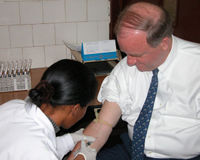
Image via Wikipedia
(ARA) – Barb Kerecz is a busy woman. The Connecticut-based working mother of five has a lot of organizing and record keeping to do to keep household chaos under control. There are forms for everything — immunization records, sports sign-up sheets, permission slips and other paperwork for her children’s activities as well as her own. But there is a resource available that Kerecz relies on to simplify some of the most important documents — her family’s health records.
Through her Aetna health plan, Kerecz uses her Personal Health Record (PHR) as a single resource for physician names and phone numbers, her children’s immunization records, health history, allergies and other information. Just like Kerecz, you may be asking yourself: “Exactly what types of tools and information are available to help me get organized and engaged in making the best health care decisions for me and my family?”
A number of resources are available — from secure Web sites to personalized health information tools. But many consumers are now finding that a PHR, which is typically available through an individual’s health plan or through Microsoft HealthVault — a new security-enhanced, Web-based consumer health platform — can house information such as insurance claims, doctors visits and prescribed medications in a secure, password-protected online record. To learn how easy and safe it is to organize and store your health information online, visit: www.aetna.com/showcase.
"The PHR provides consumers with secure, reliable and current information that they can share with their doctors so that, together, they can make better informed decisions about their health care needs," says Karen Weinseiss, Aetna’s vice president of Product Management.
So, how can a PHR benefit you? Here are a few ways:
* More information leads to better care. Not only do health plan PHRs like the Aetna CareEngine-powered PHR typically have your claims data automatically loaded into the PHR, they also let you add information such as family history, over-the-counter medicines and allergies. Having this personal health information and sharing it with your physician online can lead to more productive visits to the doctor and help consumers and their physicians make better informed decisions about their health.
* Tracking your prescriptions and doctors’ visits will help you keep your own health a top priority and may help you better comply with treatment recommendations. After all, the more information you have at your fingertips, the more likely you are to follow your physician’s advice, such as finishing all your antibiotics or sticking to your diet.
* Using a PHR may also save you money. If your doctors know about your previous tests and lab results, they can avoid unnecessary and duplicate tests. More importantly, they can provide better care, since information like past medications and allergies should be listed on your PHR.
* A PHR can come in handy when you’re away from home — whether you’re around the globe on vacation, or displaced from home after a natural disaster. With a PHR, your health history is available online to you and your new doctors 24 hours a day, 7 days a week.
Ask your insurance company or employer if a PHR is available to you now, or if it will be in the future. Millions of consumers can expect to have a basic or more advanced online PHR available to them this year.
Courtesy of ARAcontent
![Reblog this post [with Zemanta]](http://img.zemanta.com/reblog_e.png?x-id=9097ba30-c214-409a-b735-122d1272a127)

